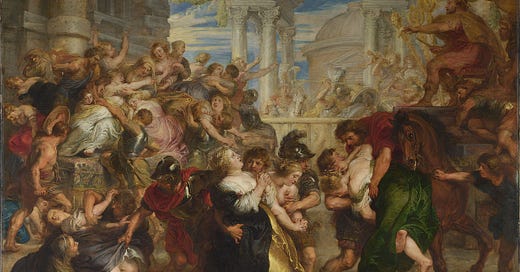How Romulus passed from being a prince of Alba Longa into being a Roman
To the Modern, Citizenship is a thing of law, but to the Ancients, it was a thing of the divine.
When Romulus and his followers gathered to found the Eternal City, he first dug a great pit, the mundus. Together he and they filled the pit with the soil of their respective fatherlands. The earth comingled, Romulus and his men were, out of many, made one.
The dead, so the men of Romulus’ time believed, did not pass from one world from the next, but remained anchored in this one, fixed at and near their burial plot. As the generations passed, the land would become filled with the shades of the ancestors. The living would pay the august forefathers homage, and the forefathers would protect the living in return. The soil of one’s fatherland was holy, filled with gods of hearth and home.
To leave behind the sacred plot of earth where one’s ancestors resided must have felt close to sacrilege. It may very well have been. So the need for Romulus and his followers to bring with them each a small clod of the holy soil of their forefathers. If men could not leave the land, then the land would have to follow them. When the ancestral soils were mingled, we can only imagine the ancestors themselves mingling. Shades which had been scattered across Latium were now brought together as one. Innumerable generations from hundreds of different families were all brought together. Spirits who were hateful of the outsider, suspicious of all those from beyond the family, now considered these strangers, friends.
This is how Romulus passed from being a prince of Alba Longa into being a Roman. Not by personal decision, but by the consent the gods.
Jealous too, were the gods. For though Romulus was of noble birth and an Alba Longan by blood, the instant he finished digging the mundus and plowing the pomerium, he was a noble scion of Alba Longa no more. Evidently, the spirits of Alba Longa had either all quit and joined Romulus on the Palatinate, or those that remained cast him out and seen him as the stranger. Romulus could not even procure a wife from the very city his grandfather sat and ruled.
Consider this situation compared to the 17th or 18th century men of the New World. A host of men set sail to frontiers unknown, crossing an entire ocean. They venture into the wilderness and build for themselves a small hamlet. The men inevitably seek wives. For them the choice is open for the whole world. The men of the hamlet may choose to intermarry with the Natives in the surrounding wilderness, they may go into into the Great Cities of their time, they may even cross the seas and back to secure a wife. Nothing stops them except their wit and charm.
The men of the modern age think nothing of marrying the foreigner (even the far weakened modern understanding), for he knows the law will match what he has decreed on earth. The finding of a wife, the formation of a family, is a personal matter which man bends the Law to recognize. The Law acquiesces to the Will of Man.
Not so for Romulus and his followers. The instant they formed their city, they as a people were set apart. The city, holy and inviolable, would not easily permit the foreigner to enter it or the citizen to leave it. This was the same for every other city. The finding of a wife and formation of a family were affairs of the ancestors and man bent himself to comply with the Will of the Gods.
The sacrality of citizenship would be preserved for centuries to come. Well past the era of kings, into the Republic when Rome was first expanding beyond Latium, she would begin her habit of sending out colonists to garrison the frontier. These colonies, sent by Rome and filled with Romans, would nevertheless establish cities which were not Roman. Just as Romulus abandoned Alba Longa by founding Rome, so too did these colonists abandon Rome by founding their colony. Even if the city was founded by the request of the Senate, the Senate had no power to alter what the gods and ancestors had ordained: each city was indivisible. There could only be one Rome, just as there could only be a single shade of one’s father.
In time, the piety of the Romans would fade, and her citizens would come to fill the world. The citizen ceased to be a member of a sacred community and became a member of a legal one. The city ceased to be indivisible. Rome the city would come to be two cities, then three, the whole of Italy and finally an entire Empire, where every man and woman claimed to be a citizen of the city they had never seen. As the gods faded, so too did Rome.
I’ve recently gotten a pet supply company (www.pettechworld.com) as a sponsor. If you want to support me, you can make an order through them for you basic pet needs. As a History in Story reader, you get an exclusive 10% off on your next purchase from PetTech World. Just use the code HISTORY10OFF at checkout on www.pettechworld.com. It's the perfect opportunity to upgrade your pet care game and show your furry friends how much you love them. The company is based in the USA, so shipping is only available there.





Thanks for this informativr piece that illustrates how meaningless modern citizenship is today in comparison with that of the past.
And when that time of Roman by Sacred Duty passed and Roman by Law came… the Republic fell, and the Laws faded to mere artifice.